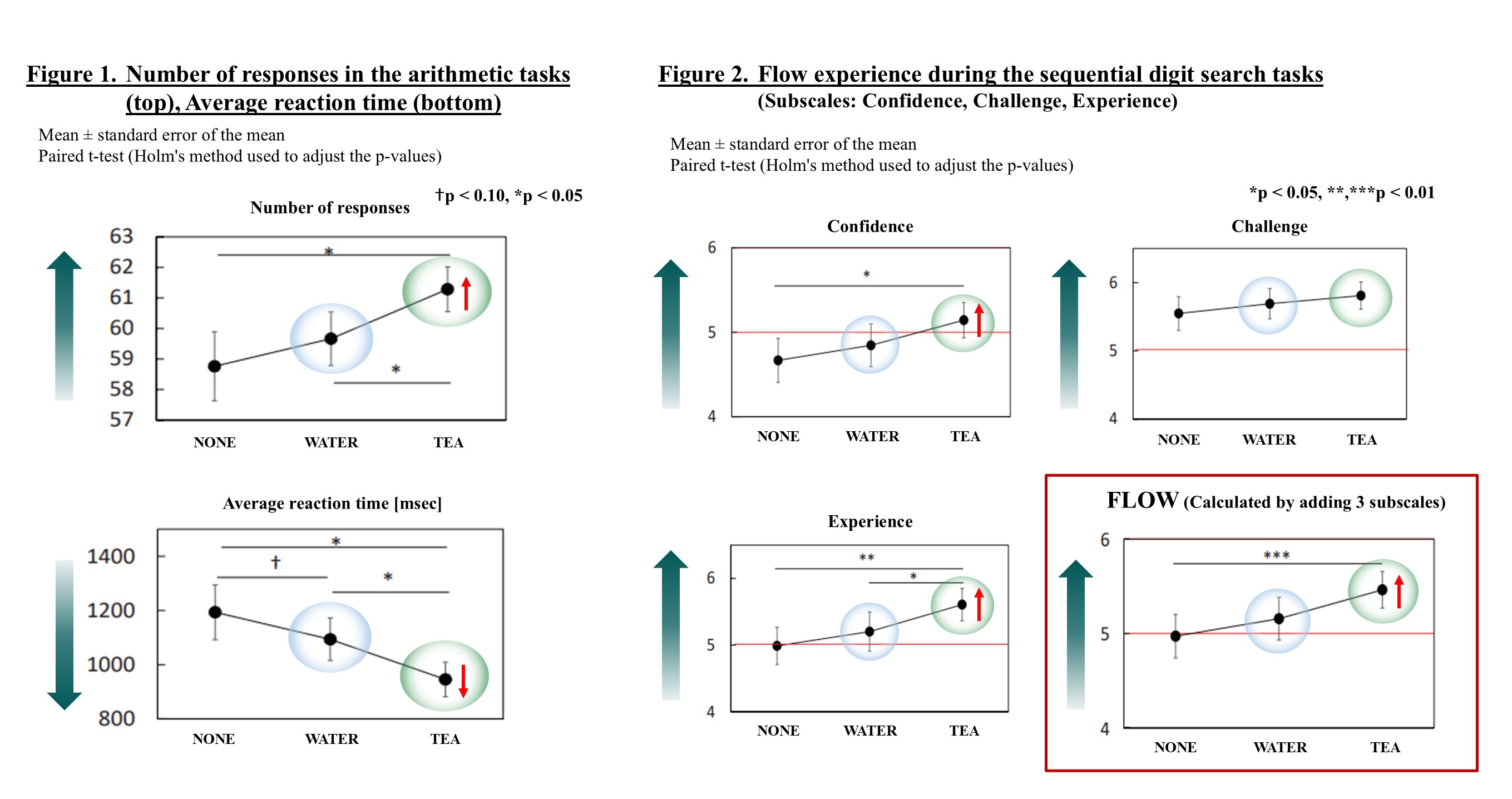Consumption of green tea beverages rapidly enhances cognitive performance and flow state (particularly the sense of immersion).
ITO EN, Ltd. (President: Daisuke Honjo; headquartered in Shibuya-ku, Tokyo), research teams of Department of Human, Information and Life Sciences, School of Health Sciences, University of Occupational and Environmental Health, and Graduate School of Science and Technology, Chitose Institute of Science and Technology, jointly conducted a clinical trial and confirmed that green tea beverage rapidly enhances task performance and flow experience(*1) during mental tasks. These trial findings have been published in the academic journal PLoS One(*2).
As the expression 日常茶飯 (nichijo sahan, meaning daily occurrence) suggests, tea is a popular beverage that plays essential roles in our lives, such as accompanying our meals, quenching our thirst, relieving fatigue or simply changing our mood. Previous research confirmed that green tea intake affects multiple physiological responses, improves task performance and helps reduce fatigue(*3). The research, however, also indicated that repeated mental tasks may have allowed participants to familiarize themselves with the process, influencing task performance and physiological responses.
A research team comprising the members of ITO EN, University of Occupational and Environmental Health and Chitose Institute of Science and Technology conducted an additional experiment to assess green tea beverage’s effects on the subjective perceptions of task performance and flow state during mental tasks. This time, participants were asked to practice the tasks sufficiently before the experiment to minimize the influence of learning.
〇 Content of research
After a 5-min rest period, twenty-two healthy male adults participants completed two mental tasks (mental arithmetic and sequential digit search tasks), under three beverage consumption conditions: 1) no beverage (NONE), 2) WATER, and 3) TEA (commercially available green tea beverage ) in that order, followed by another 5-min rest period. The procedure was repeated successively. In the 2) and 3) conditions, participants consumed 210 mL of beverage three times during the session. The Subjective Fatigue Feelings (SFF) Questionnaire and Brief Job Stress Questionnaire were administered before and after the experiment to assess subjective evaluations. After each task, participants completed the shortened version of Flow Experience Checklist (FEC) and Time Perception Assessment.
〇 Research results
In the mental arithmetic tasks, the number of correct responses was higher in the TEA condition than that in the NONE and WATER conditions. The average reaction time in the TEA condition was shorter than that in the NONE and WATER conditions, demonstrating the positive effects of green tea beverage on mental arithmetic tasks indicated by the previous research(*3)(Figure 1). In the sequential digit search tasks, the results showed no significant differences in task performance across conditions. Nevertheless, the flow state score in the TEA condition was significantly higher than that in the NONE condition, and the experience score, one of the subscales used as an indicator of the absorption level, was significantly higher in the TEA condition than that in the NONE and WATER conditions(Figure 2). During sequential digit search tasks, participants in the TEA condition perceived significantly shorter task duration than that in the NONE and WATER conditions, indicating that they were fully concentrated in their work(Figure 3). The drowsiness score significantly increased after the task compared to before the task in the NONE condition. A marginally significant increase was observed in the WATER condition. The score remained unchanged in the TEA condition, confirming a constant state of alertness(Figure 4).
〇 Suggestions of results
The results of this research showed that after consumption, green tea beverage rapidly enhances cognitive performance during mental arithmetic tasks, and enhances flow state, particularly the sense of immersion, during sequential digit search tasks in healthy male aduls. Which suggests that the intake of green tea beverage during mental tasks may help enhance work engagement. Task performance was measured immediately after consumption. In addition to assessing the effects of green tea components after absorption, the effects of aroma components must also be assessed. Additional study is being conducted to obtain more detailed results.
People who are engaged in creative professions, such as people who work at IT companies, favor tea. In the US, tea is known as a beverage that inspires creativity. This clinical trial confirmed that sipping green tea beverage in a “chibidara” fashion (*4) may lead to a better state of deep absorption, enhanced productivity and satisfaction during tasks. Going forward, as a Health Creation Company, ITO EN will continue to contribute to creating healthy and fulfilling lifestyles for customers and a sustainable society from various standpoints, not only conducting research that contributes to the development of products with health appeal, but also actively engaging in research that addresses customers’ concerns and questions about health.



(*1) The psychological state of deep absorption in which individuals experience heightened productivity and satisfaction. The term was coined by psychologist Mihaly Csikszentmihaly. To be in a state of flow (deep absorption), a person needs to have a high skill level (the horizontal axis in the chart) and a high challenge level (the vertical axis in the chart).
(*2) Kurosaka C. et al., Green tea consumption rapidly enhances cognitive performance and flow state during mental tasks in healthy young adults. PLoS One. 2025 Jul 10;20(7):e0328394. doi: 10.1371/journal.pone.0328394. (https://journals.plos.org/plosone/article?id=10.1371/journal.pone.0328394)
(*3) Kurosaka C. et al., Effects of green tea and roasted green tea on human responses. Scientific Reports. 2024 April 13 ;14(1):8588. doi: 10.1038/s41598-024-59383-y.(https://doi.org/10.1038/s41598-024-59383-y)
(*4) Sipping a small amount of tea over a long period of time while carrying out desk work.
